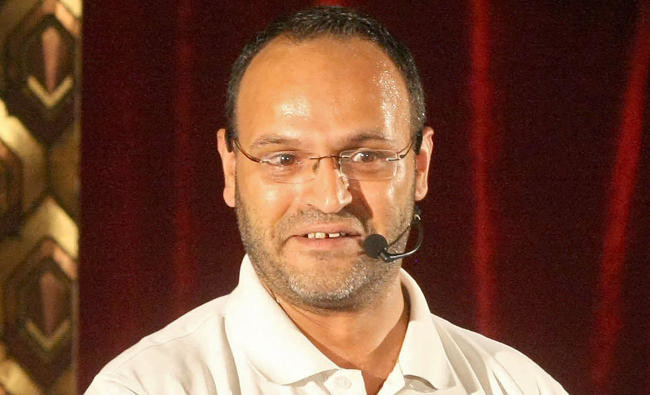BEIRUT: Lebanon was shocked on Friday by the arrest of the writer and actor Ziad Itani for what a security source called “collaborating with Israel over the past three years.”
Itani, a comedian and playwright, was arrested on Thursday evening while returning home in the Ain Al-Rammaneh district in Beirut. Security sources said that he plotted to assassinate Interior Minister Nohad Machnouk and monitored Abdul Rahim Mrad, a former minister.
A security forces statement said: “On 23/11/2017, the State Security Directorate General carried out a quality proactive operation in counterintelligence, and it arrested the Lebanese citizen called Ziad Ahmed Itani, who is an actor, director and playwright (born in Beirut 1975), on charges of collaborating and communicating with Israeli enemy. A specialized unit for the State Security, following monitoring, tracking and investigating for several months inside and outside Lebanese territories, and on direct instructions from the General Director, Maj. Gen. Tony Saliba, confirmed the crime against the suspect Ziad Itani.”
The statement said the suspect admitted to the tasks he was assigned in Lebanon, including “monitoring a group of prominent political figures, and strengthening relations with their close associates, in order to get as much details as possible about their lives, occupations, and especially their movements, and providing his operators with detailed information about two prominent political figures, whose identities will be revealed in our following statements. (The tasks also included) establishing a Lebanese nucleus to support the concept of normalization with Israel, promote Zionist ideas among the intellectuals, and provide his operators with reports about the reaction of the Lebanese society in all its aspects after the political developments which occurred during the past two weeks in Lebanon.”
The security sources added that Itani, according to his confessions, was in touch with a woman who was supposed to come to Lebanon on Dec. 2, and he booked a hotel for her in the Mount Lebanon area.
State Security seized communication equipment from Itani’s home, including a laptop and three cellphones he was using for communication, according to security sources.
Itani became famous in the past few years after he presented the comedy “Beirut Al-Jadideh Road,” which talked about changing traditions in Beirut, and “Beirut on the Tree,” which he presented for many years. He took part in many TV satirical programs.
Lebanese comedian, spying for Israel, arrested
Lebanese comedian, spying for Israel, arrested

Egypt completes trial run of new Suez Canal channel extension
The Suez Canal Authority said in a statement that during a trial run two ships passed through a new stretch of the canal’s two-way section without incident.
Following the 2021 grounding of the container ship Ever Given that blocked the vital waterway for six days, Egypt accelerated plans to extend the second channel in the southern reaches of the canal and widen the existing channel.
Its revenue from the waterway, the gateway to the shortest route between Europe and Asia, has nevertheless tumbled since Yemen’s Houthi militants began attacking ships in the Red Sea in November 2023 in what they say is solidarity with Palestinian militants in Gaza.
Egyptian President Abdel Fattah El-Sisi said on Thursday that due to “regional challenges,” the country had lost approximately $7 billion in Suez Canal revenue in 2024, marking more than a 60 percent drop from 2023.
According to the Suez Canal Authority, the latest expansion extends the total length of the canal’s two-way section to 82 km from a previous 72 km. The canal is 193 km long in total.
“This expansion will boost the canal’s capacity by an additional 6 to 8 ships daily and enhance its ability to handle potential emergencies,” the Suez Canal Authority said in its statement.
Earlier this year, Egypt said that it was considering an additional expansion project separate to the 10 km channel extension.
Houthi rebels say new air raids hit northern Yemen

- Houthis say raids hit the Buhais area of Hajjah province’s Medi district
SANAA: Yemen’s Iran-backed Houthi rebels said new air raids hit the country’s north on Saturday, shortly after they claimed responsibility for a missile attack on Israel.
A Houthi military statement said the raids were carried out in the Buhais area of Hajjah province’s Medi district, blaming “US-British aggression.”
There was no immediate comment from London or Washington.
The Houthis made the same claim about a raid they said hit a park in the capital Sanaa on Friday.
Hostilities have also flared between the rebels and Israel in recent days after a series of Houthi missile attacks prompted deadly Israeli air strikes in rebel-held areas on Thursday.
Six people were killed, including four at Sanaa airport, where World Health Organization chief Tedros Adhanom Ghebreyesus was waiting for a flight.
On Saturday, the Houthis claimed they had “successfully” targeted the Nevatim base south of Jerusalem with a ballistic missile.
The Israelis had earlier said a missile launched from Yemen was shot down.
The Houthis, part of the “axis of resistance” of Iran-allied groups, have been firing at Israel and ships in the Red Sea and Gulf of Aden in solidarity with Palestinians since the war in the Gaza Strip broke out last year.
Lebanon returns 70 officers and soldiers to Syria, security official says

- Many senior Syrian officials and people close to Bashar Assad have fled the country to Lebanon
Lebanon expelled around 70 Syrian officers and soldiers on Saturday, returning them to Syria after they crossed into the country illegally via informal routes, a Lebanese security official and a war monitor said.
Many senior Syrian officials and people close to the former ruling family of Bashar Assad fled the country to neighboring Lebanon after Assad’s regime was toppled on Dec 8.
The Syrian Observatory for Human Rights (SOHR), a London-based organization with sources in Syria, and the Lebanese security official said Syrian military personnel of various ranks had been sent back via Lebanon’s northern Arida crossing.
SOHR and the security official said the returnees were detained by Syria’s new ruling authorities after crossing the border.
The new administration has been undertaking a major security crackdown in recent days on what they say are “remnants” of the Assad regime. Several of the cities and towns concerned, including in Homs and Tartous provinces, are near the porous border with Lebanon.
The Lebanese security official said the Syrian officers and soldiers were found in a truck in the northern coastal city of Jbeil after an inspection by local officials.
Lebanese and Syrian government officials did not immediately respond to written requests for comment on the incident.
Reuters reported that they included Rifaat Assad, an uncle of Assad charged in Switzerland with war crimes over the bloody suppression of a revolt in 1982.
Earlier this month, Lebanese Interior Minister Bassam Mawlawi said top Assad adviser Bouthaina Shaaban had flown out of Beirut after entering Lebanon legally. In an interview with Al Arabiya, Mawlawi said other Syrian officials had entered Lebanon illegally and were being pursued.
Visiting Libyan official says discussed energy, migration with new Syria leader

- Syrians fleeing war since 2011 and seeking a better life have often traveled to Libya in search of work or passage
- Power in Libya is divided between the UN-recognized government based in the capital Tripoli and a rival administration in the east
DAMASCUS: A senior official from Libya’s UN-recognized government met Syria’s new leader Ahmed Al-Sharaa on Saturday and discussed issues including diplomatic relations, energy and migration.
“We expressed our full support for the Syrian authorities in the success of the important transitional phase,” Libyan Minister of State for Communication and Political Affairs Walid Ellafi told reporters after the meeting.
“We emphasized the importance of coordination and cooperation... particularly on security and military issues,” he said, while they also discussed cooperation “related to energy and trade” and “illegal immigration.”
Syrians fleeing war since 2011 and seeking a better life have often traveled to Libya in search of work or passage across the Mediterranean on flimsy boats toward Europe.
Ellafi said they also discussed “the importance of raising diplomatic representation between the two countries.”
“Today the charge d’affaires attended the meeting with me and we are seeking a permanent ambassador,” he added.
Power in Libya is divided between the UN-recognized government based in the capital Tripoli and a rival administration in the east, backed by military strongman Khalifa Haftar who also controls the south.
Representatives of Haftar’s rival administration in March 2020 opened a diplomatic mission in Damascus.
Before that, Libya had not had any representation in Damascus since 2012, following the fall and killing of longtime dictator Muammar Qaddafi in a NATO-backed uprising.
It was not immediately clear whether the charge d’affaires had been appointed since Sharaa’s Islamist group Hayat Tahrir Al-Sham (HTS) and allied factions toppled Assad on December 8 after a lightning offensive.
Also on Saturday, images published by Syrian state news agency SANA also showed Sharaa meeting Bahrain’s strategic security bureau chief Sheikh Ahmed bin Abdulaziz Al-Khalifa.
No details of the discussions were provided.
On December 14, top diplomats from eight Arab countries including Bahrain called for a peaceful transition in Syria with United Nations and Arab League support following Assad’s overthrow.
A day earlier, the official BNA news agency reported that Bahrain’s King Hamad had told Sharaa that his country was ready to “continue consultations and coordination with Syria.”
Damascus’s new authorities have received envoys from across the Middle East and beyond since taking control as countries look to establish contact with Sharaa’s administration.
First war-time aid convoy reaches besieged south Khartoum

CAIRO: Civilians in a besieged area south of Sudan’s war-torn capital received their first aid convoy this week since the war began 20 months ago, local volunteers said.
A total of 28 trucks arrived in the Jebel Awliya area, just south of Khartoum, the state’s emergency response room (ERR), part of a volunteer network coordinating frontline aid across Sudan, said Friday.
The convoy included 22 trucks carrying food from the UN’s World Food Programme (WFP), one truck from Doctors Without Borders and Care, and five trucks loaded with medicine from the UN children’s agency, UNICEF.
The local group and UNICEF said the supplies would help meet the “urgent health and nutrition needs of an estimated 200,000 children and families.”
Jebel Awliya is one of many areas across Sudan facing mass starvation after warring parties cut off access.
Since the war began in April 2023 between the Sudanese army and the paramilitary Rapid Support Forces, nothing has gone in or out without both parties’ approval.
ERR volunteers endured months of negotiations, constant suspicion and threats of violence to secure even limited access.
“Access to the area has been essentially cut off due to the conflict dynamics,” UNICEF’s Sudan representative Sheldon Yett said, adding it took three months of talks to get the convoy through.
“The trucks were detained on more than one occasion, and drivers were understandably reluctant given the risks involved,” he told AFP.
The lack of access has also prevented experts from making an official famine declaration in Khartoum.
Famine has already taken hold in five areas of Sudan, a UN-backed report said this week.
The WFP says parts of Khartoum and Al-Jazira state, just to the south, may already be experiencing famine conditions, but it is impossible to confirm without reliable data.
Across the country, more than 24.6 million people — around half the population — are facing high levels of acute food insecurity.
Both sides have been accused of using starvation as a weapon of war against civilians.
The war has killed tens of thousands and uprooted more than 12 million people, causing one of the world’s largest humanitarian crises.


















